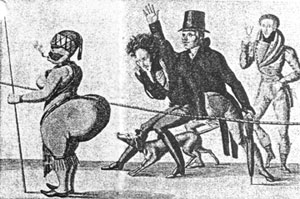 |
|
||
|
|||
![]()
A woman exploited
Historic sideshow travesty takes center stage in Parks'
wry Venus
By Hope Green
With his severe physical deformities, the Victorian-era protagonist of
the 1980 film The Elephant Man both repels and fascinates viewers. As
the story unfolds, we learn to see past John Merrick's tragic disfigurement
to the person within. Yet it takes almost until the climactic moment when
Merrick famously bellows to a taunting crowd, "I am not an animal
-- I am a human being!" that we really absorb this message.
|
|
|
|
A portrait of Baartman by an unknown artist. |
|
Director Eve Muson believes audiences will have a similarly shifting,
discomfiting response to the title character in Venus, the CFA school
of theatre arts production onstage next week at Boston University Theatre's
Studio 210. This play, too, is a tragedy about a person with an unusual
physique who is cruelly put on display as a public amusement and forced
to live outside the mainstream. It is based on the true story of Saartjie
Baartman, a South African woman with an exceptionally large posterior,
who was lured to Europe in 1810 on false pretenses and exhibited nude
in a London circus for four years before being sold to a Paris animal
trainer. Her keepers called her the "Hottentot Venus."
But Venus is not simply a heart-wrenching tale. As described in promotional
materials, it's "an examination of the objectification of peoples
and cultures." Playwright Suzan-Lori Parks sets a deliberately ironic
tone, lacing the script with humor and breaking up serious scenes with
musical vignettes to create emotional distance.
"The style of the play is very much like vaudeville," says Muson
(CFA'82,'86), a CFA faculty member. "Parks picks up on the sideshow
part of Baartman's life. So while we're laughing at the ridiculousness
of the situation, we're also thrown into our own stew of why am I laughing
at this most tragic thing? Many of the professors who have come to our
rehearsals to help out have said, 'It's working, because I'm laughing
my head off, but then I hate myself for laughing.' That is the experience
you're supposed to have, in that you're supposed to be aware of your own
reaction."
Parks recently became the first African-American woman to win the Pulitzer
Prize for drama, with her Broadway hit Top Dog/Underdog, and her work
is being produced all over the country.
"We are always looking for not only classical material, but also
the best contemporary plays," Muson says. "This is the kind
of play our students are going to encounter in their careers."
Parks draws from actual accounts of Baartman's story, but creates a fictional
romantic relationship between Baartman and George Cuvier, an anatomist
who studied her in his laboratory and tried to prove that she represented
a subhuman species.
When Baartman died, Cuvier received permission to dissect her body. Afterward,
her skeleton, a plaster cast of her body, and her dissected brain and
genitalia were exhibited at the Musée de l'Homme in Paris. Her
remains were then put into storage at the museum until this past summer,
when they were finally laid to rest near her homeland in South Africa.
|
|
|
| The exhibition of Saartjie Baartman in Europe between 1810 and 1816 was the subject of numerous editorial cartoons and handbills, with illustrations like this one. | |
"There is a lot in the play about dissection," Muson says.
"And of course, in dissection, you become only your parts. This story
is very much like Elephant Man, because it's very similar in its tragedy
and its structure. It's about someone being seen as an object and not
her whole self. As the audience we all become part of that problem. We're
all taught as children that we oughtn't stare at a woman with a huge birthmark
or a person in a wheelchair or with some other kind of difference, but
at the same time there is that childlike side of us that wants to stare."
The cast of 12 includes 4 seniors in principal roles and 8 juniors, each
of whom plays multiple bit parts, such as circus spectators, other sideshow
freaks, and jurists in a courtroom scene, where noted abolitionists try
in vain to rescue Baartman. The action moves very quickly, Muson says,
with supporting actors playing up to four different characters in a 10-minute
span.
Juniors, seniors, and graduate students make up the design staff, who
are involved with costume design, lighting, sound, and stage managment.
Sets and costumes are simple, merely suggesting the early 19th century,
but the scenery is enhanced with slide projections of historical materials,
posters, anatomical drawings, and "Hottentot Venus" handbills.
Chinasa Ogbuagu (CFA'03), who plays Baartman, has researched the woman's
horrific story to gain insight about her character. "In all my history
classes I never learned about anything like this," she says. "There
is not a lot written from her point of view, just what the scientists
wrote about her. I'm trying to feel what it must have felt like for her,
to be put on display and have people laugh at her, and to be treated like
an animal and put in a cage. What's hard about that is trying not to let
the emotion take over -- trying to go through the scenes and still be
this person on parade without just crumbling."
The CFA school of theatre arts will present Suzan-Lori Parks' Venus, directed by Eve Muson, Wednesday, October 9, through Saturday, October 12, at the Boston University Theatre, Studio 210, 264 Huntington Ave. Admission is $10 for the general public, $8 for BU alumni, $5 for senior citizens and non-BU students, and free with a BU ID. For tickets, call the box office at 617-266-0800. Reserve tickets by calling the BCA box office at 617-426-2787.
![]()
4 October 2002
Boston University
Office of University Relations

